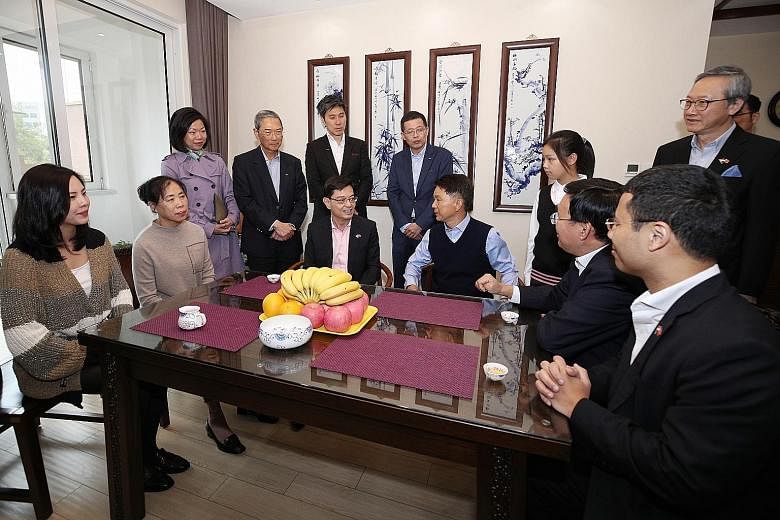As Singapore and China enter their fourth decade of cooperation, the most immediate task for both countries is to work on strengthening epidemic prevention and control, said Deputy Prime Minister Heng Swee Keat.
In an interview with Chinese daily Lianhe Zaobao published yesterday, he added that there is room for both countries to collaborate in other areas, including upholding a rules-based multilateral trading system, managing an ageing population, finance and technology.
"Right now, our main task is to control the pandemic," Mr Heng said. "If we can control the pandemic, economic and social activities will be able to gradually resume. So this is the most critical thing now."
Singapore and China are commemorating 30 years of formal ties this year. In August, Beijing's most senior diplomat, Mr Yang Jiechi, visited Singapore and called on leaders here, including Prime Minister Lee Hsien Loong.
On Thursday, which marked the 71st anniversary of the founding of the People's Republic of China, President Halimah Yacob and PM Lee wrote letters to congratulate China on the occasion.
In the interview, Mr Heng also outlined other areas of potential cooperation, including in finance.
The lesson learnt from the Asian financial crisis and the 2008 global financial crisis was that finance is vital for economic stability and growth, Mr Heng said.
Many Asian countries have substantial savings, and it is worth studying how this money can go towards sustainable development projects, he added.
He gave the example of infrastructure projects under China's Belt and Road Initiative, noting that Asia needs US$1.7 trillion (S$2.3 trillion) in infrastructure development each year.
The Asian Development Bank (ADB) has said Asia will need to invest US$1.7 trillion per year in infrastructure until 2030 to maintain its growth momentum, tackle poverty, and respond to climate change.
But there are risks if projects are not suitable or if the financial system is not strong, Mr Heng said.
Singapore and China, along with multilateral organisations such as the World Bank, the ADB, and China's Asian Infrastructure Investment Bank, can work together to train officials and cooperate with officials, bankers and investors to design a better platform for the flow of funds.
Mr Heng also touched on the potential for Singapore to work with China to grow its position as an offshore trading hub for the Chinese renminbi, and stressed that innovation and technology will play a more important role in the future.
He praised the entrepreneurial spirit that he witnessed in China as well.
The Deputy Prime Minister recounted a visit he made to the city of Wenzhou in Zhejiang province, which has a reputation for entrepreneurship. There, in a small showroom, he saw thousands of beautiful watches of many different brands.
The showroom, he later found out, was a collaborative effort by enterprises which were willing to cooperate with their competitors in order to build a common platform and better serve buyers.
"I hope our businesses will be able to learn from this spirit," Mr Heng said. "Although businesses may be in competition with one another, they may face common problems. Businesses must think about how they can cooperate to solve these common problems, and then think about how to differentiate their products."
Lianhe Zaobao and ThinkChina - an online magazine by the newspaper - have also published a new photo book to commemorate 30 years of Sino-Singapore ties.
The book, titled In the Founders' Footsteps: 30 Years Of Singapore-China Diplomatic Relations, contains rare photos celebrating the links between both countries, such as paramount leader Deng Xiaoping's visit to Singapore in 1978 and founding prime minister Lee Kuan Yew's many trips to China.
SEE OPINION


